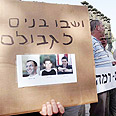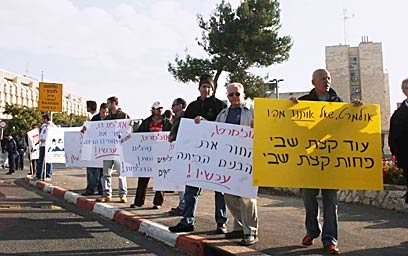
Protest: Public's fatigue - danger to Zionism
Protestors picket Olmert's office in shifts until captives come home. Parents of past POW's join struggle, demand gov't resign. 73' commander and activist Moti Ashkenazi: 'It's time for new vision'
The view from Prime Minister Ehud Olmert's Office these days is almost always the same. Protest follows protest as impassioned causes both overlap and contradict one another on the sidewalk opposite the building.
"If I could, I'd leave the country," said Yehudit Guy on Sunday morning, "there's been a significant erosion of (our) values." Yehudit's son Ami Guy was a pilot during the Yom Kippur War, his plane was shot down over the Golan Heights and he was held captive by the Syrians for eight and-a-half months.
Guy arrived this morning in Jerusalem, along with 30 activists for the release of kidnapped soldiers Gilad Shalit, Eldad Regev and Ehud Goldwasser, to take part in the protest shifts maintained outside the PM's office.
The protestors gather there every Sunday, for five months now, to protest the percieved helplessness displayed by the government in the efforts to bring the soldiers home.

Protestors outside Olmert's office Sunday morning (Photo: Gil Yohanan)
Guy recalled her son's captivity more than 30 years ago. "It's like nothing has changed," she said, "in the Yom Kippur War too we had to fight against Golda Meir and Henry Kissinger (the US secretary of state at the time who negotiated the return of the prisoners). In 1973 we were united as a country, we cared about each other, today people belittle it – as though a boy sitting captive doesn't mean anything."
Protestor Zvi Lahav, 52, who was a POW in Egypt after the fall of the Mezach stronghold (part of the Bar Lev fortification line along the eastern Suez Canal) during the Yom Kippur War, criticized Olmert's comments last week.
"It was a mistake to say that our boys can spend a little more time in captivity and nothing will happen. He (Olmert) doesn't understand – every hour in captivity is an entire world. Every hour is more interrogation, more torture, more thoughts that you've been abandoned," he said.
Watchdogs
Motti Ashkenzi knows a thing or two about post-war ramifications. The commander of the Budapest stronghold (the largest on the Bar Lev Line), he sought a reckoning of justice with those responsible for the Yom Kippur War.
Now he leads the struggle to form a commission of inquiry into the second war in Lebanon. He isn't deterred by the difficulties or by the bureaucracy however. "If we don't act as watchdogs, we will repeat the same mistakes we made 30 years ago," he said.
"I believe that there will yet be a state commissioned inquiry – the government will resign and the chief of staff will be dismissed. It took time in 74' too," he stated.
"I know that there's a general exhaustion from the reports we’re being flooded with, but we mustn't tire now. We have to remember that 2,600 soldiers were killed in Yom Kippur – that dealt a terrible blow to an entire generation. We were tired by we didn't give in to it, we climbed on top of the barricades and we won."
Ashkenazi added: "This fatigue is dangerous, it's dangerous to Zionism, and we cannot surrender to it. The dangers and threats will not lessen, they will only grow."
"It's time to define a new vision, new social norms that will provide answers for the acute problems in Israel. And that starts with the government resigning and the formation of a commission of inquiry," he concluded.
An unwritten pact
Maj. Gen. (res) Uzi Dayan, a leader of the struggle to secure the release of the soldiers, was furious at Olmert for going on the record with details of the captives' estimated medical condition.
"We were responsible with the information, which we knew of two months ago," said Dayan. "Olmert's conduct is disgraceful, he must rebuild the damaged trust with the families of the captives' and with all of Israel's soldiers."
"He must remember always that there is an unwritten pact between the soldiers, their families and the State of Israel. We will do everything to defend the home front, say the soldiers, but if something happens to us, you make sure we come home in one piece," Dayan stated.
"The soldiers kept their end of the deal and Olmert isn't keeping his. This could have been solved while the UN resolution 1701 was being drafted, the aid money to rehabilitate Lebanon should have been conditioned with their release. They should have at least demanded that the Red Cross be allowed to visit them."
Meital Zur contributed to this report










